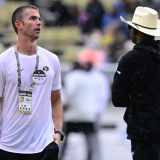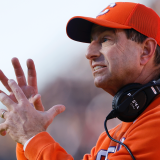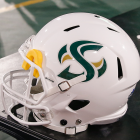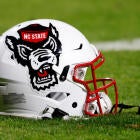As Ole Miss' defense begins, a larger question: Is cheating really this rampant?
If a linebacker is being offered $650K, what payouts are floated for five-star quarterbacks?
Ole Miss goes before the NCAA infractions committee Monday defending itself in an alleged wide-ranging, cash-soaked, humiliating scandal that threatens to bring the football program to its knees.
And there's every possibility that's not what we'll remember most about the case.
Not after reading the transcript of one Leo Lewis, the Mississippi State player who was given limited immunity by the NCAA in exchange for information regarding Ole Miss.
SB Nation did a fine job reporting the contents of Lewis' testimony to the NCAA a couple of weeks ago, but it may have buried the lead.
Within the piece, Lewis' mother Tina Henderson told a former Ole Miss assistant that LSU had offered $650,000 for the services of her son.
If even close to the truth, that amount of money changes everything we know about cheating in college athletics. If even close to the truth, this case isn't so much about Ole Miss cheating but the lengths any wrongdoer would be willing to go.
And there is reason to believe $650,000 is close to the truth. I checked with the story's author, Steven Godfrey, he said the figure wasn't a typo on his part. The transcript was verified.
More than that, there is anecdotal and factual evidence of sizable six-figure payouts.
The father of former Texas A&M wide receiver Ricky Seals-Jones said he was offered $600,000 for the services of his son. That shocking information came from the fine reporting by authors Armen Keteyian and Jeff Benedict in their 2013 book "The System: The Glory and Scandal of Big Time Football." One SEC and one ACC school, the father said, offered to double the offer the other school made for Seals-Jones.
While Auburn and Cam Newton were never found guilty of any wrongdoing, the number thrown around to get the services of young Cam was $180,000.
Think back to the Logan Young/Albert Means scandal at Alabama. Young was possibly the only booster to commit a federal crime in trying to land a recruit. The late Alabama loyalist allegedly paid $150,000 for the services of Memphis blue-chip lineman Albert Means. Young was convicted of money laundering and racketeering. He was permanently disassociated from the program by Alabama and died in 2006.
The NCAA is going to do what it's going to do with Ole Miss, but there apparently is a culture out there that can't be slowed with the removal of a few scholarships.
I made some calls to see if $650,000 was even possible in this day and age. I was told that was absolutely the case by a former college assistant who went into detail.
Today, he said, the offers can include a possible redshirt year in case the player is injured. So, now we're supposedly talking about an annual "salary" of $130,000 for five years. That works out to a monthly stipend of almost $11,000.
But how do schools/cheaters/boosters afford it? An anecdote shared from the late 1990s can help answer that question:
A coach called on several monied boosters each year, assembling all of them in a room. That coach then instructed the boosters which games to bet on, based on the coach's belief his team could cover the spread. If the bets hit, viola! -- a stash of cash to buy players.
Remember, in Leo Lewis' case, we're talking about the No. 1 rated inside linebacker (No. 64 overall) in 247Sports' Class of 2015. Seals was the No. 2 athlete in the 2013 class (25th overall).
What would a top player … or the nation's No. 1 quarterback … be worth?
That's an open-ended question. Look at your own paycheck. You are worth what someone will pay you, and this underground economy sets its own rules. Seals-Jones' father said he didn't take that monster offers because he worried about being caught.
Chester Jones apparently had a conscience. That's one of the few parking brakes in this economy. Good luck, NCAA enforcement, with the rest of it.
Think about what $650,000 can buy.
- It is 3 ½ times the median price of the average U.S. home, $188,900.
- Thirteen times the donation ($50,000) it takes to secure a suite at Texas A&M's exclusive Founder's Club inside Kyle Field.
- It would buy 81 Dodge Chargers, 2009 model. (Former Ole Miss receiver Donte Moncrief was driving that car in 2013 when he was ruled ineligible for impermissible benefits.)
It's scary to think that might be the going rate for any 18-year-old, who thanks to the sugar daddies, would have no problem changing a hundred but can't change his own oil.
Too much, too often for the too young, it would seem. Nothing seems to have changed from the "glory days" of cheating in the 1980s except the zeroes at the end of the offer.
This is not to disparage LSU, Ole Miss or any other school that may have been named in the NCAA's investigation. This is all about the Benjamins. It's stunning a booster/school would go to such lengths.
To ignore such figures these days is ignoring the obvious.
In our "Candid Coaches" series last month, the majority of FBS coaches we surveyed said no more than 10 percent of all schools commit major violations.
It may not be the percentage of cheaters but the financial will of those who would cheat.


















